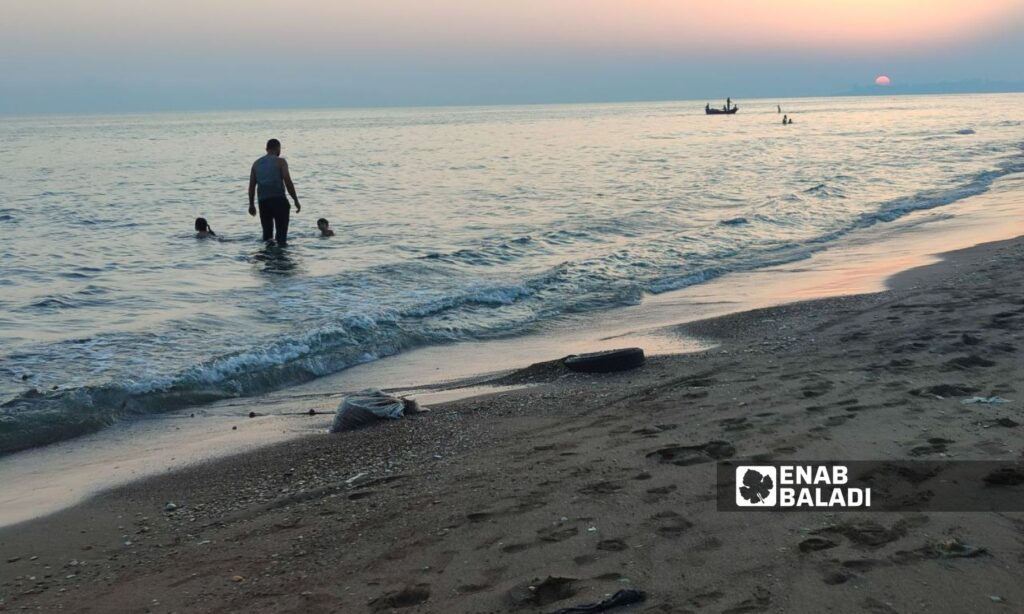Latakia – Linda Ali
Most homes in the city of Latakia and its suburbs lack cooling and air-conditioning means due to power rationing for 20 hours a day. Residents have experienced harsh days during last week’s heatwave, with temperatures exceeding 40 degrees Celsius and feeling like 44 degrees due to the high humidity in the coastal city.
Hossam (34 years old), a government employee, sent his wife and three children to their village near the Slanfeh area, escaping the intense heat that caused one of his children to have a rash due to sweating and the heat. However, he could not join them because his manager refused to grant him leave.
He soon joined them over the weekend before returning to his “sauna,” as he described his home in Saqoubin suburb, Latakia city.
Hossam considered buying a battery-operated fan, but when he learned the price, he abandoned the idea altogether, as it costs 800,000 Syrian pounds, the minimum price for battery fans.
There is another type priced at 450,000 pounds, but its blades are unprotected, posing a great risk to his children, according to what he told Enab Baladi.
Abidin (45 years old) has no relatives in nearby villages. He managed to escape the heat only in the absence of the sun, as he told Enab Baladi. He takes his family on trips to the popular areas on the southern corniche and stays there until late at night before returning to their home, where they cannot open the windows due to fear of insects and bugs. The insulating windows are worn out and were not replaced this year.
Hossam, a vegetable vendor in the Qaninis market, soaked a towel in water and placed it over his head to attempt to cool down, a method he replicated at home. He spent more than 50,000 Syrian pounds in three days on ice bags, with each bag costing 5,000 pounds.
Many residents of Latakia resorted to quick baths several times a day, but this option is considered a luxury for many in the city of Jableh and the neighborhoods of Bisnada, Datoor, al-Ramel al-Shemali, and Zaqzqaniyah, due to the difficulty of obtaining water because of the power rationing. The water crisis in the governorate remains unsolved.
Samia (29 years old), a telecommunications engineer working in one of the government institutions in Jableh city, spent her nights fanning her one-and-a-half-year-old child with a cardboard piece, trying to make him sleep peacefully. The intense heat and high humidity caused him to wake up frequently, and he lost his usual appetite. The doctor told her that the extreme heat was the main cause.
It is not surprising that going to the beach is the last resort for the coastal governorate residents, even to the public beaches that do not require an entry fee as they are unserviced like al-Snobar Beach. This is due to the high transportation costs, though some locals managed to take their children swimming.
The university students suffered the most, waiting for hours for Latakia-Jableh buses, seeking shade under the trees at Jableh bus station near the university dormitories.
Naya (19 years old), an agriculture engineering student at Tishreen University, told Enab Baladi that she almost fainted due to the high temperatures before managing to squeeze into one of the buses. Once a bus is sighted, everyone rushes, hoping to finally get home.
The transportation crisis in Latakia governorate persists and intensifies on Thursdays, making it nearly impossible to find a bus within a short time, with passengers having to wait for at least two hours.
The head of the Syrian Astronomical Society, Abdul Aziz Snobar, told Sham FM radio on June 6 that August will be the hottest in history, with temperatures possibly reaching 45 degrees.
He pointed out that humidity levels make the heat feel more intense; when the temperature is 40 degrees, the perceived heat is 44 degrees.
Syrians will suffer from rising temperatures without any means to combat it due to the absence of electricity, with the only available relief being the purchase of an ice bag.

